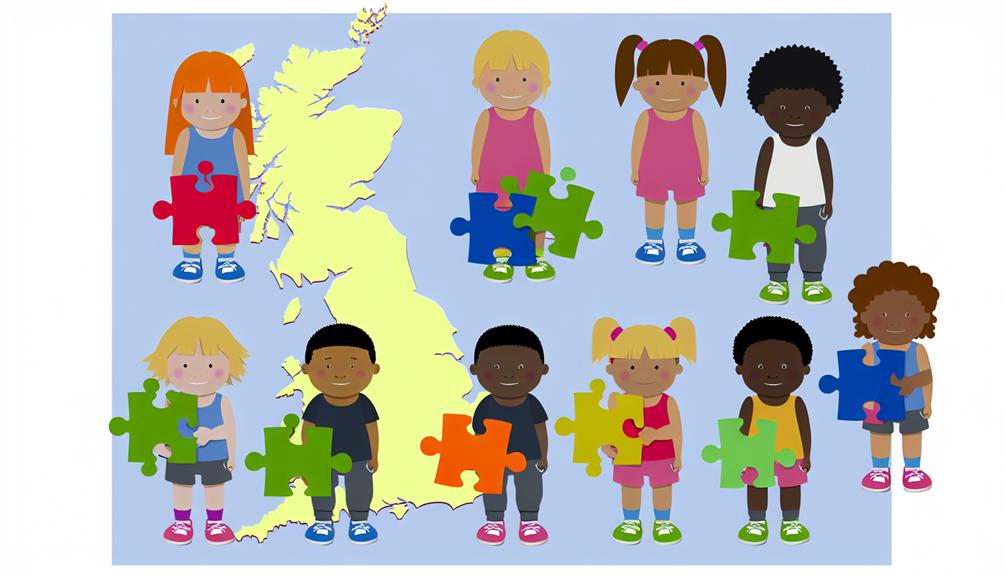5 Best Policies of the UK Foster Care System
A Little Help Can Make A Big Change.
5 Best Policies of the UK Foster Care System
The top policies of the UK Foster Care System include Matching and Placement, emphasizing the child’s needs and cultural identity. The Safeguarding and Welfare Promotion policy guarantees child safety and emotional stability. Training and Support offers foster parents education, coping strategies, and financial assistance. Under the Children’s Rights and Participation policy, foster kids learn about their rights, fostering more significant outcomes. Finally, the Review and Complaints Procedure guarantees transparency and accountability within the system. As you explore further, you’ll encounter more nuanced, pivotal aspects of these policies.
Key Takeaways
- The Matching and Placement Policy ensures child’s needs are prioritized and compatibility with potential foster families is assessed.
- The Safeguarding and Welfare Promotion Policy ensures child’s safety, welfare, and emotional stability in the foster care system.
- Training and Support for Foster Parents Policy provides training, resilience strategies, and financial support to foster parents.
- Children’s Rights and Participation Policy ensures foster children are educated about their rights and involved in decision-making processes.
- The Review and Complaints Procedure enhances accountability and transparency in the foster care system, ensuring effective complaint handling.
Matching and Placement Policy

Often, the matching and placement policy in the UK foster care system is a complex process that aims to prioritize the child’s needs and compatibility with potential foster families. It’s a delicate balancing act, ensuring placement stability while honoring the child’s cultural heritage.
You see, placement stability is key in the matching process. It’s about finding a home where a child can thrive, grow and develop without the tumult of shifting foster placements. There’s a thorough assessment of potential foster parents, examining their ability to provide a stable, nurturing environment. This stability isn’t just about a roof over the child’s head—it’s about providing emotional stability, consistent care, and a secure attachment.
Cultural matching is another critical aspect of this policy. It’s not just about ethnicity or religion, but the child’s language, traditions, and values. The UK system places great emphasis on preserving a child’s cultural identity, ensuring they’re placed with families attuned to their cultural needs.
In essence, the matching and placement policy is a detailed, multifaceted strategy designed to provide the most beneficial environment for each child. It’s a policy that places the child’s needs at the forefront, aiming for stability and cultural compatibility.
Safeguarding and Welfare Promotion
Shifting smoothly to the safeguarding and welfare promotion policy, it’s crucial to understand that this is a policy designed to guarantee the child’s safety and overall well-being in the foster care system. This policy is underpinned by welfare legislation, which specifies the standard of care all foster children must receive.
The focus of this policy is twofold: to protect the child from harm and abuse, and to promote their welfare by providing adequate emotional stability in a nurturing environment. It’s important to grasp that the welfare promotion aspect of the policy isn’t just about physical well-being. It also includes emotional, social, and intellectual development.
The policy requires regular risk assessments to identify and alleviate any potential threats to the child’s safety and welfare. It also necessitates regular reviews of the child’s emotional stability, ensuring their feelings and thoughts are considered in all decisions.
In essence, the safeguarding and welfare promotion policy is a crucial tool that safeguards the foster child’s safety, promotes their emotional stability, and ensures their welfare, thereby facilitating their holistic development in the foster care system. It’s a holistic approach that places the child’s well-being at the forefront of foster care practices.
Training and Support for Foster Parents

Mastering the intricacies of foster care, it’s essential that you, as a foster parent, receive thorough training and support to guarantee the best possible outcome for the child in your care. The UK system prioritises this through a range of policies, focusing on fostering Parental Resilience and the provision of Foster Care Stipends.
Parental Resilience, the ability to manage stress and bounce back from challenges, is paramount. The UK system champions this through continuous training modules that equip you with effective coping strategies, thereby enhancing your resilience. These modules cover a broad spectrum of topics, from understanding the emotional needs of foster children to dealing with potential behavioural issues.
Foster Care Stipends are another cornerstone of the UK’s policy, designed to alleviate financial stress. These stipends provide a safety net, ensuring that you’re not out of pocket while meeting the child’s needs. Additionally, they offer the financial freedom to create an enriching environment for the child.
In essence, the UK’s approach goes beyond mere custody, emphasizing the need for well-equipped, emotionally resilient foster parents. This holistic training and support model, coupled with financial assistance, guarantees that foster parents can effectively nurture and guide children in their care.
Childrens Rights and Participation
How are children’s rights and participation safeguarded within the UK’s foster care system, you might ask? Through thorough Child Advocacy and Rights Education, the system guarantees that children aren’t just passive recipients of care, but active participants in decision-making processes that impact their lives.
Child Advocacy is a significant pillar in this process. It involves trained, independent advocates acting on behalf of children in foster care, promoting their rights, voicing their concerns and ensuring their needs are met. They work as an intermediary, ensuring children’s perspectives are considered in case planning and review meetings.
Rights Education, on the other hand, is a proactive approach to empower children with knowledge of their rights. Foster children are educated about their entitlements, including the right to be respected, cared for, and heard. They’re informed about their right to participate in decisions about their placement, care plans, and life in general.
These policies, combined, provide a solid framework for children’s rights and participation within the UK’s foster care system. They not only protect children but also empower them, making them active agents in their lives rather than mere dependents. This approach ultimately leads to more positive outcomes for children in foster care.
Review and Complaints Procedure

While empowering children and advocating for their rights form the backbone of the UK’s foster care system, it’s equally important to have a robust review and complaints procedure in place. This mechanism not only guarantees the welfare of the children but also enhances the accountability of the system.
Procedure transparency is paramount in this process. It’s essential that you, as a foster parent or carer, understand the steps to file a complaint and how the system will handle it. Each step should be clear, devoid of ambiguity, to make certain that issues are addressed promptly and effectively.
Complaint resolution is the next critical facet. The system should be equipped to resolve complaints in a timely and efficient manner. The resolution process should be impartial, thorough, and sensitive to the child’s needs. It’s crucial that the child’s voice is central to the investigation and that their concerns are taken seriously.
Furthermore, reviews should be regular to identify potential improvements in the system. Feedback from children, foster parents, and social workers should be incorporated into systemic revisions, strengthening the service’s efficiency and effectiveness. Essentially, a well-structured review and complaints procedure is crucial for upholding the integrity of the UK’s foster care system.
Frequently Asked Questions
How Does the UK Foster Care System Financially Support Foster Parents?
You’re financed via a structured payment system, which considers the child’s needs and age. You won’t pay tax unless you exceed a certain threshold. It’s a policy designed to alleviate financial pressures as a foster parent.
What Is the Process for Becoming a Foster Parent in the Uk?
To become a foster parent in the UK, you’ll meet eligibility criteria including age and residency status. You’ll then attend training programs, undergo a thorough assessment, and finally, await approval from a fostering panel.
How Does the UK Foster Care System Handle Cases of Cultural or Religious Differences Between Foster Parents and Children?
You’ll find the UK foster care system utilizes cultural sensitivity training and religious accommodation strategies. This promotes respect and understanding for any cultural or religious differences between foster parents and children.
What Is the Average Duration of a Foster Care Placement in the Uk?
You’d find that the average duration of a foster care placement in the UK is about 22 months. Placement stability greatly influences foster care outcomes, with longer placements often resulting in better emotional and educational outcomes.
What Mental Health Support Is Available for Foster Children in the Uk?
In the UK, foster kids can access various mental health supports. They’re offered therapeutic interventions, including art therapy, to help confront and manage emotional distress. It’s an essential part of their care system.
Conclusion
In essence, maneuvering the UK foster care system is like piloting a ship through a intricate network of canals. The matching and placement policy guarantees the right fit, while the safeguarding policy protects the child’s welfare. Training boosts foster parents’ confidence and the children’s rights policy gives kids a voice.
Lastly, the review and complaints procedure offers a safety net for all involved. These five policies work together to create a robust and effective system.

Book A Time To Talk To Us:
You May Also Like...
Modern innovations are reshaping Britain's foster care, offering a glimpse into a future where trauma-informed care and technology-driven support are the norm.
Boosting efficiency and empathy, seven major innovations are reshaping the landscape of UK's foster care system - discover what lies ahead.
We Help Foster Carers Get The Best Deal For ALL Their Family
Are you feeling unsupported and undervalued by your current LA or fostering agency?
At Agency Transfers, we’re dedicated to helping you explore your options and find the perfect fit. Our team of experts can help you navigate the process of transferring to a new fostering agency or breaking away from the local authority.
With better support, training, and compensation, the sky’s the limit. Don’t let anything hold you back from achieving your fostering dreams.
Contact us to find out how we can help you take the next step in your fostering journey.




